- Words Miki Hellerbach
- Photography Meara Kallista
Being one of the biggest rappers in your country ten years into a successful career has gotta feel nice. Notion meets Sarkodie.
Ghanaian rapper Sarkodie exudes this potent and desirable energy through the screen as he ventures in a vehicle around the area near his home. Laced in what he refers to as “corporate drip” with subtle jewellery, a clean white button-down, and sleek black shades, Sarkodie is all business. While he knows he is at the top of the game in his sphere, the possibilities that opened for him even in the past year have reasserted and reinvigorated him to conquer more global spaces and put on for his country even further.
Sarkodie feels like a rapper/ambassador more than anything, yet even with that responsibility, he has in his 6th album a body of work that signifies relief. He has garnered a certain level of security in his process so even as he stretches his reach, his core foundation allows him to thrive musically in a pocket he has already mastered. ‘No Pressure’ sounds not only like Sarkodie is on top of the mountain but that the mountain is really just a skyscraper he was the architect of. Even within his most fierce flows, you hear a calm, even in his most dark tones, you feel an urge to dance, and every time he sings you still hear remnants of his guttural center. The purpose of his latest seems to be to prove he knows exactly who he is and what you want from him.
I couldn’t help but ask mostly OG questions when speaking to the veteran, but I still managed to grab some sincere pandemic moments and breakdowns of his sonic playfulness.
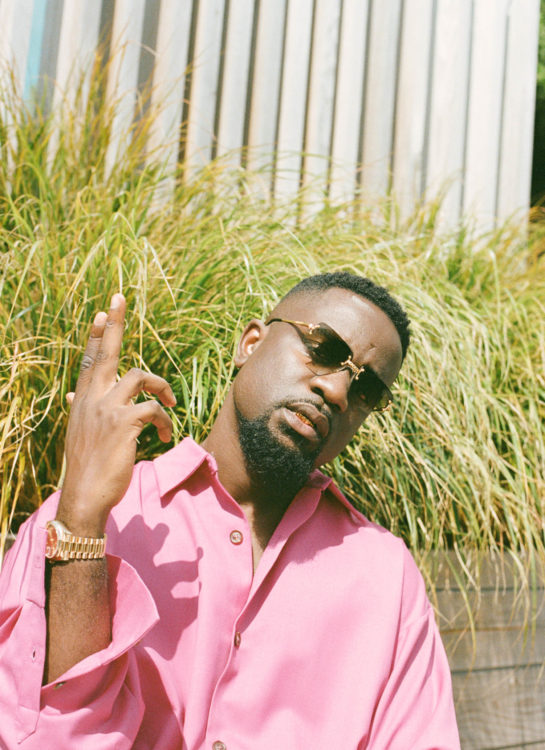
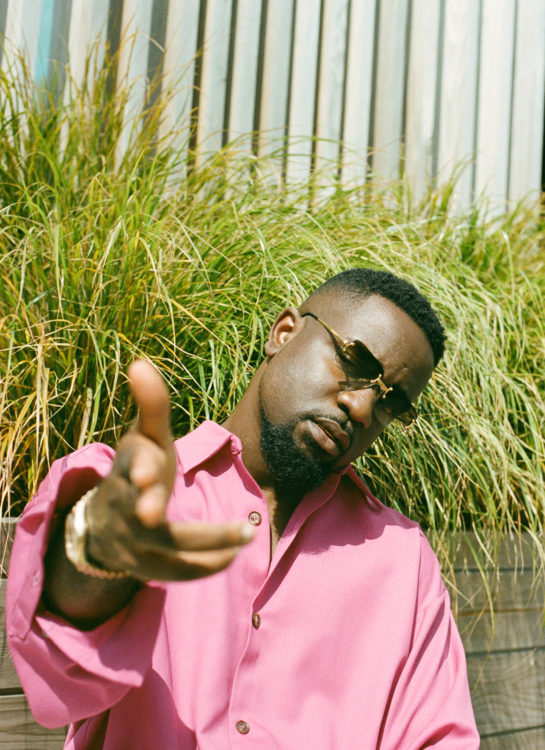
How was your album listening in London, for your new project ‘No Pressure’?
It was incredible. Short notice because we weren’t sure it would happen. It took like three to four days to put it together. We called in a few people that we could get a hold of: the media, a few friends, and artists. Everybody showed up and showed love.
It must’ve been wild as such a veteran, 6 albums in, having to put events like this and touring on hold when the pandemic hit.
It has two sides to it. During the pandemic, we saw the effects especially with the creative arts as in being able to perform physically with people. Having events like an album listening wasn’t possible. During that time I had released my last album ‘Black Love.’ I had a lot planned with the rollout and promotion but we couldn’t move. The album, as good as it was, didn’t get to where I wanted it to get too. That was the downside. What I did realise artists could benefit from though in a situation like that, was that people needed entertainment regardless of what was happening. The only source of entertainment was music, movies, etc. So we had streams going up as much as we weren’t performing physically and that was a good side. Personally, I normally don’t go out so I didn’t really see too much of a difference. I don’t go to the club unless I have a show and I rarely do shows. I do max 6 or 7 in a year. But the moment you know you can’t do something you want to do it.
What do you think ‘Black Love’ specifically provided for people during that time?
When it had to do with the music, talking about the sounds I went for, the artists I went for, the whole direction made it the type of album you needed to sit down and relax to. To take a drive with, and just chill while you’re listening to it. So it was a good time to drop it.
‘Black Love’ was about romantic love, but also about fatherhood as that was a relatively new thing for you. How was navigating that during the past year?
Naturally, I have always possessed the qualities of a father long before I had my kids. I like to nurture. I used to be that way to my sisters’ kids and my friends’ kids and practice a lot because I love children. So having two myself came way easier to me. I love being a dad. It was a great time I got to cherish. They were the ones keeping me cool. My daughter is super funny. She started rapping in the pandemic. My son is also now my best friend.



I gotta ask about your daughter’s rap skills!
I know right! She comes to the studio when I’m recording in the house. What is shocking is her timing. She knows the cadence, she knows when to rap and when not too on the beat. It’s crazy. I would let her practice with the beat and let it play for a while then I’d just hear her making sounds. It wasn’t like bars, like I could understand what she was saying, but she had a flow. Obviously, what I do is rubbing off on her. That was a great highlight from lockdown.
That mindset she has where she goes off instinct is something I’ve heard you say in interviews is something you’ve tried to keep all through your adult life. Can you expand on the reason for maintaining that childlike fearlessness?
As humans, the more we live and grow the more we try to come between our natural self. As kids, we used to dream and there were no limitations to it. I see my daughter talk about stuff as an adult you might think isn’t possible. This fearlessness we have as kids we tend to lose as we move further in life. It’s about what we feed into our soul and mind. I try to keep that same energy because that’s what keeps me going. Everything I said I was gonna do like, “One day I’m gonna be on the BET stage and Ghana awards, I’m gonna be the best rapper, and gonna do this for a long time,” I did it. I believe in whatever I think so I can keep going until I’m tired and don’t wanna do it anymore.
That’s easier said than done though for sure. So how do you maintain it?
I try to make sure I keep the right energy around me. If I have friends or anyone that comes around me that has very negative energy, I still always try to stay positive. People see me as a very serious person, which is how I want them to see me, but I like to laugh a lot. When you keep that around you, you can go through serious issues but not be broken because of how you dealt with it. Your circle plays a main role in maintaining that peace you wanna protect.

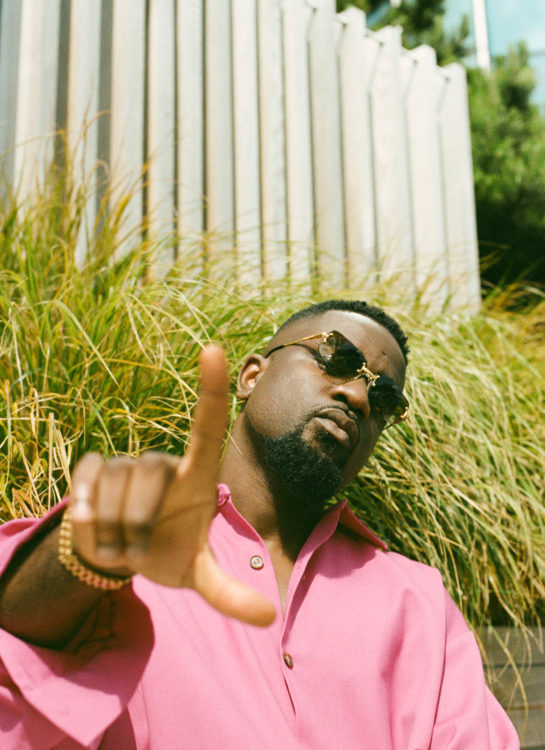
You’ve talked before about how as an artist your business is you and how you need a strong team to maintain that. Can you speak on how you’ve personally set up yours?
I’ve realised there are different types of artists and individuals and everyone should be able to look at themselves as a critic. Then know what you possess and what your power is as well as your strengths and weaknesses so you can use that to your advantage. So if I look at the industry I can see artists where people love their music but don’t necessarily care about them. It could be bad, but not numbers-wise if you’re just looking for money because you just need hits. You don’t care if people like you or not, you just need them to stream the music. Or you have an artist that has personality but doesn’t necessarily have the music. So he should use that strength in a different way. I study myself and read the comments I get from the consumers and that’s what I use. That’s why I don’t allow people to come in too much to say what they think I’m supposed to do. It’s not limiting yourself, it’s just being smart. I keep people around who don’t wanna change it, but understand what we stand for and move towards one goal. The more I move, I keep coming across people who take me to the destination where I wanna go.
Well, you clearly have drawn people to your personality and the music so what are your weaknesses that you’ve identified, and who do you have around you to help with them?
I think my weakness is I always just think about my organic fan base and doing music for just them. That maybe puts limitations on how far the music can go. But then someone like my DJ thinks otherwise because DJs are thinking commercially all the time. He always goes head to head with me when I’m being stubborn about putting out certain records. He’s like, “Look I know you wanna rap, do your hip hop, and all of that but let’s do something for the clubs. We need some bangers.” He keeps me doing what I wanna do but throws on the beats that are gonna cross borders and then does the groundwork to possibly make those songs my next biggest worldwide.
Obviously, that mind-state has a bit to do with pride which you’ve talked about being a positive thing for you to have when some may view it as negative. Can you expand on that?
The word pride as soon as you say it has a negative vibe to it. Especially where I’m from in Africa it’s not really accepted well. What I was saying is, especially when it comes to me being a Ghanaian, I’m proud and I can speak it free in your face whether you understand it or not. I’ll rep my country and make sure you know this is where I’m from. When I went to the BET stage I made it clear to them that I wanted them to come to Ghana. You need that to survive. You have to believe in something a thousand percent to be able to make it work. That’s what I mean by that.

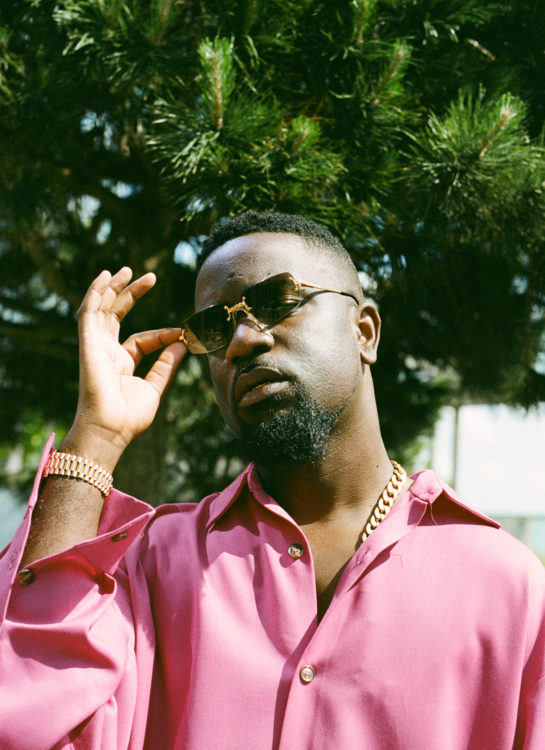
So then with this album ‘No Pressure,’ this feels like your pride-filled victory lap. Was that your intention?
Yeah! It’s me bigging myself up and saying, “You know, Sarkodie, as much as you wanna be humble about this, you’ve been doing this for ten years and you’ve done well.” Especially with rap, it’s really hard to own it for that long. So I need to treat myself and go, “You actually did it and you have every right to tell people not to give you pressure cuz you trust the process.” I believe in creatively having freedom. I understand wanting to tell me what I’m supposed to do, but respectfully I’ve been doing this for ten years. So if you trust me and don’t give me pressure I can give you the music I feel like I want and you guys want to hear. That’s really what the album is about.
You can really hear that in your spirit. How do you feel like that affected the sonics?
When you listen to the production everything makes you feel on top of the world. The beats are what I’d call bossy. You can see what I’m wearing now, it’s all corporate drip. Feeling like a king. I was naturally drawn to production that fits my mindset at this point. If someone brought me a beat that took me back to a time that wasn’t like this I would skip it. All the beats I picked match my energy.
That’s inherently in your first single and visual “Vibration” feat. Vic Mensa. How’d that come together?
Myself and Vic kept up on social media and he told me he was coming to Ghana. I had set up a studio and was doing a writing camp so I was in the mood of recording 24/7 when he came through. I had a producer Nova already at the studio. He played a couple of beats and as soon as I heard that one I said, “That’s the sound. It feels like ‘No Pressure’” and Vic loved it. It’s rare you find a beat when two artists are about to collaborate and everybody goes, “This is it.” It happened so naturally. He laid the hook and then left. Now, I don’t write verses on the spot like I used to when I was coming up. Now I need to take my time cuz as I said, no pressure. I relax with the beat, play it in the car and drive around so then I can put out my best. So after he laid the hook I took it home and played it for a while then wrote the verse. He later sent his verse and the rest is history.



The other song that really gives that ‘No Pressure’ feel is your collaboration with UK legend Giggs, “Round 2.” You both sound so comfortable and align so well.
That song is one of the hardest records on the project. That’s actually the second record I did with Giggs and that’s why it’s called “Round 2.” The first link was like a meeting. He’s my favourite rapper from the UK and apparently he also respected my craft but I was just honoured to meet him. It was all surreal but I could just see we didn’t connect our energies. We just did music because we were in the studio. We should’ve just had conversations. We did record something that was big but as soon as we listened before we left we’re like, “Nah man if it’s Sarkodie and Giggs, it should be harder.” When I flew back to the UK, we went back to the studio. That beat for “Round 2” was played and we jumped on it and loved it.
That’s funny. You basically had to take the pressure out of the room for it to work.
You see! The first time was like pressure, but as soon as we took our time and literally became friends, like we kept up about birthdays and releasing tracks, it became natural. So then when we recorded the next one you could feel the energy. Like you could really hear the collaboration.
You said later on the record a pretty bold statement so I had to ask, will you actually rap until you’re 80?
(Laughs) I might rap past 80 if I take care of myself. I wanna rap for that long. I don’t care, I’m gonna keep going.
Then you also called yourself the “rap Bob Marley” so how do you see your influence and style crossing over?
Obviously, as rappers, we have a tendency to get carried away. You get extra, but obviously, we are talking about BOB MARLEY and it takes a lot to compare yourself to him. But when you’re in battle talking about yourself in the highest level of rap success, that’s the highest person you could compare yourself to. I use him as the benchmark, at least in Africa, of where I think Sarkodie is. There is no conversation about rap where Sarkodie would not be mentioned in Africa. Every day on Twitter there is somebody who is compared to Sarkodie.
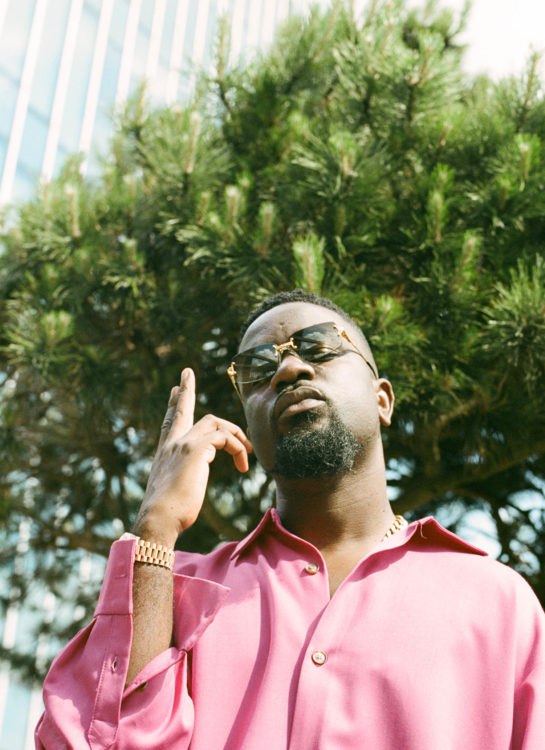
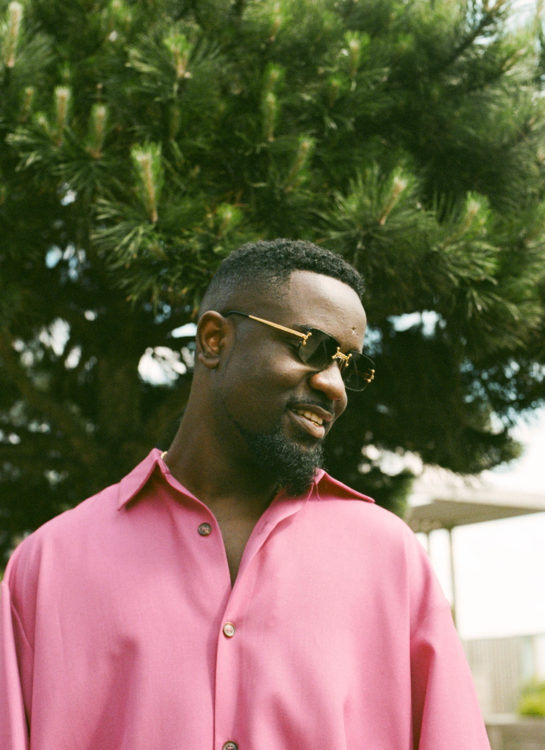
So then on the album, on a bit of a different vibe, you get a song like “Whipped.” It’s more of a danceable record and takes about being “whipped” in a positive light. I’ve never heard it talked about that way, but that’s sort of the epitome of “No Pressure” no? Like, “I’m whipped and that’s great.”
Exactly! Words are about how you present them and what your intent is. I didn’t even think about it like you said but I get it. That’s one of my best records on the album though and I really love that song so much.
Have you ever heard another song about being “whipped” being a good thing?
I don’t think so. (Both laugh)
Staying on that more danceable sound though, another standout is your track with Oxlade, “Non Living Thing.” What excites you about the newer sounds he and other artists like him bring to the table?
I’m an artist that tries new sounds a lot. I love music. I tend to do rap but this afternoon my whole playlist was slow jams. I’ll jump on any beat in any genre that’s cool. That “Non Living Thing” beat is crazy. It’s Afrobeats mid-tempo but still has some dark energy. I love dark beats, even ones that can get you scared when you listen to them. I have some productions I play at night and I love that energy. When you have your Timberlands and all black on, on a dark stage with a spotlight on you and then these sounds come on, I love it. When I hear elements of that in a commercial record that’s the best combination to have.
Staying on new sounds and artists, you’ve spoken on financial literacy for up and comers being important and for people with information needing to share it. What’s the biggest thing you think young artists need to know and learn in that space?
We all have different paths but there’s one thing you can’t change that’s like a hidden rule. If you take something seriously, you give it your all. Here in Africa, a disadvantage is we don’t have a structure that supports arts so you can do it successfully easily. But the advantage of that is it breeds entrepreneurs and serious business-minded people because you have to find a way to survive. There aren’t investors investing. Energy and talent aren’t enough, every penny that you make has to go back into it. If you are the business, you can’t cheat the game. A lot of artists think you come in, get a little change, and go buy cars but the consumer is going to need an upgrade. You can’t ball out and then drop some trash and say, “Hold this while they give me more money.” You’re gonna lose over time. You have to bring on people and pay them because you take the business seriously. It’s hard because not all of us were born as bosses. But because of where we are I don’t think we have the luxury of just being an artist. Until then we have to put every penny back. I shot my first video with my first big paycheck. That’s the type of commitment you have to have. You have to put it back in and flip it. Be worth more to attract more.
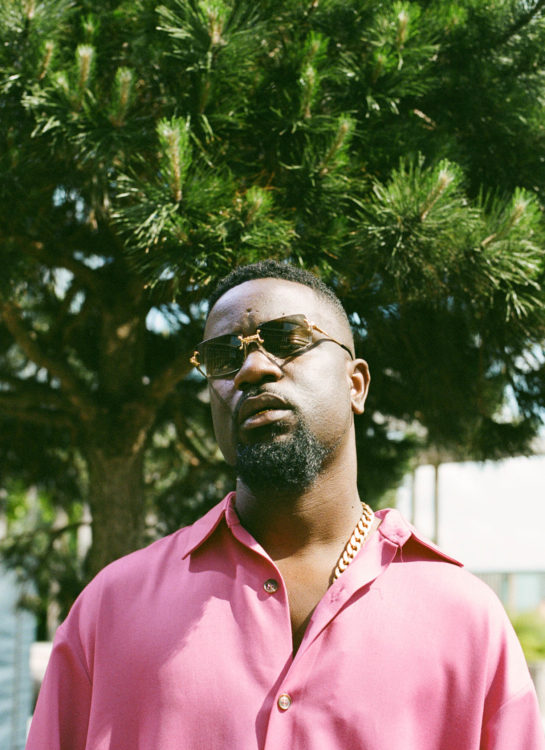

One of the biggest ways you’ve reinvested into yourself and your community is with your annual Rapperholic Concert in Ghana. Can you explain how it came about and where it’s at now?
It started off as an album launch as that was the name of one of my albums. How that first show turned out, it couldn’t just happen that one year. It’s now the biggest platform, as far as shows are concerned, in Ghana. Every artist you can think of in Ghana has been on that platform. It’s moved from just a Sarkodie concept to a night celebrating Ghanaian music. Every artist with a major hit each year performs. It’s me on the stage and I bring on everybody. The energy is crazy. I’ve had people come from the states as well and they’ve become super fans who always wanna come to it. This year will be the 8th edition.
You still navigate the balance between rapping in your native tongue Twi and English on records and in performance. How did you decide when to do which?
It was initially a careful decision. There was a time I was on stage rapping in Twi and people who are Asanti, who speak my language, were moved and I could see the reaction. But then I would see some people looking like, “What is he talking about?” I’m someone who likes a challenge and I want it all. I never wanna settle for just one thing. I read the room and realised there were people from different tribes and countries. So I sat down and said, “How do I get these people to still listen to me and still have my Asanti people.” Then I realised music is all about sonics. It just has to appeal to the ear. So the cadence of the rap, melody, and beat, you have to really hit on that. Why do I listen to Sean Paul? Not cuz of what he’s saying, but how it makes me feel and how it sounds. So I made it a task to make my flow appeal to people who maybe don’t understand one hundred percent of what I’m saying but still appreciate the art.
So since it’s been such an odd time between two projects, how do you think you’ve grown most as an artist and person between ‘Black Love’ and now ‘No Pressure’?
It just reaffirmed all I believe. If anything has changed my belief is on steroids. I’ve seen there’s no limits to what we can do. I was rapping in Twi and even those in Ghana said there would be limitations. That I wasn’t going to be able to appeal to people who spoke other languages in Ghana and I did it. Then I moved from Ghana and made it in Africa. From Africa, we went to BET and we’re doing records with Vic Mensa and E-40. Now we’re on Notion. I just reaffirmed the fact that I need to put in more work.

